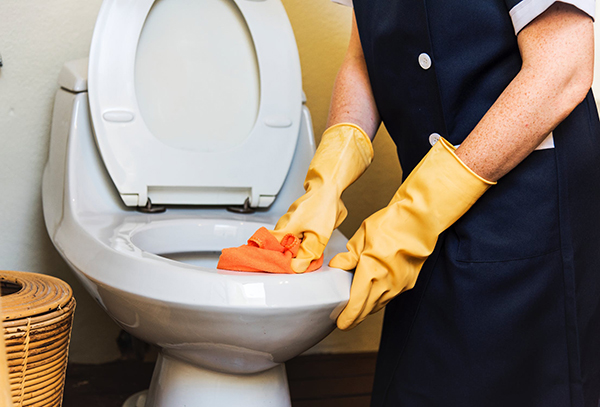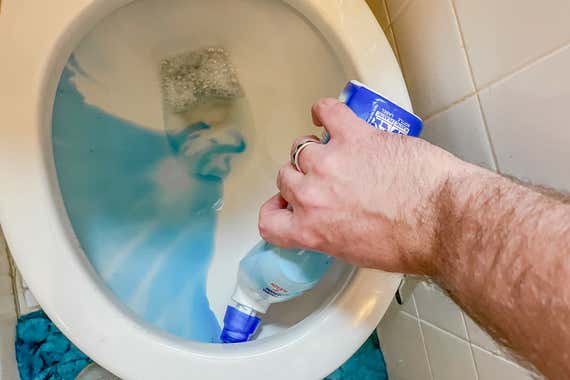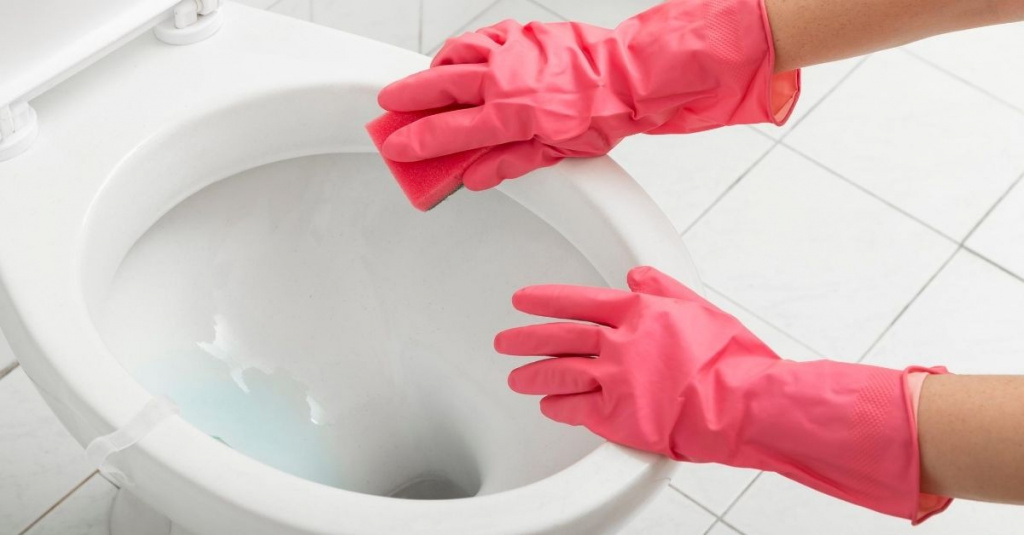
How to clean the toilet from rust — recipes and professional tools
It would seem that rust can only form on metal, but residents of cities with centralized water supply often notice characteristic yellow and orange marks on toilets, sinks and other plumbing fixtures. The composition of tap water is to blame for this, in which iron impurities from the soil and traces of corrosion, which the walls of non-galvanized pipes are exposed to, can be found. Moreover, tap water often contains chlorine, which reacts with metal in the aquatic environment, so the inner surfaces of the pipes rust. And if the toilet cistern or the faucet in the sink, the bathroom is leaking, that is, the water constantly flows down a little over the surface of the plumbing, a rusty coating appears on it. It is not easy to remove it, but modern household chemicals help to cope with the task, they are most effective in this matter. Also, some experienced housewives, who are used to doing without purchased chemicals, use their own preparations and methods to clean the toilet from rust. From this article, you will learn how to get rid of such a household problem without much effort.

Work Precautions
Whatever tool you use to clean the toilet bowl or other plumbing from rust, you need to keep in mind that the composition of the drug may be too aggressive in relation to the skin of the hands, mucous membranes, olfactory organs, as well as some details, for example, to the plastic parts of the inside of the tank. Therefore, in order not to harm yourself or spoil the plumbing, you should follow simple recommendations during cleaning:
-
Always carry out all housework, if you foresee the use of any cleaning products, with rubber gloves. And when using drugs such as Domestos (based on acids) — this is generally an iron rule.
-
It is highly desirable to clean the toilet in a respirator, wearing “construction” glasses and a rubber (plastic) apron.
-
If the product has a too strong smell, try to ventilate the room both during the procedure and after it.
-
If rust stains have appeared not only in the toilet bowl, but also in the tank, before cleaning it, drain all the water (you can use a small bucket) and, if possible, remove the plastic parts, as acids can have a negative effect on materials that are not resistant to such substances.
-
If rust streaks appear in the sink, bathtub, shower, be sure to fix the plumbing (faucets, pipes, leaking components, etc.), as the problem will occur again and again. If it’s a matter of water quality, you can put a common filter.
-
All brushes, sponges, washcloths used to clean the toilet from rust should be thoroughly washed after the procedure and sent for storage out of the reach of children and animals. It is not worth using them for housework, for example, for cleaning the kitchen.
Well, the last piece of advice — if the cleaning agent gets on the skin or mucous membranes, you do not need to wait for a negative reaction from the body, immediately rinse the place where the chemistry has splashed. And if there is severe discomfort, pain, burning, irritation of the skin, tearing, pain in the head, it is better to seek medical help, perhaps this is a reaction to a chemical burn or an allergy to the composition of the drug.
How to clean the toilet from rust with household chemicals
Now in any store you can find a wide range of cleaning products for plumbing, including toilet bowls. They are available in the form of powders, sprays, liquids and gels, the latter are more convenient to use, as they slowly flow down the walls and cover the surface with a film, which ensures constant contact between the active substances and the contaminated surface. Such drugs can be divided into three groups, depending on whether which components are included in the composition precisely in order to dissolve rust, limescale and other persistent contaminants:
-
Acids that dissolve organic and inorganic contaminants. These are, for example, hydrochloric, orthophosphoric, sulfuric, silicic acids. Typically, these harsh chemicals are only included in slurries in combination with acid corrosion inhibitors, which should slow down the reaction and prevent degradation of the surface to be cleaned. Such preparations are ideal for removing rust and other stubborn dirt from metal, faience, enameled objects, including toilet bowls, urinals and other sanitary ware. Acid-based chemistry should not be used on surfaces that are not acid-resistant. This, for example, marble, granite, acrylic. -
alkalisdesigned to remove substances of organic origin. They can also have a negative destructive effect on rusty plaque. -
Chlorine, which has cleansing and antimicrobial properties and the ability to neutralize unpleasant odors. However, chlorine-based products are unlikely to help deal with rusty deposits.
Whatever active substance the plumbing care product contains, it will definitely contain surfactants — an important component of solutions that allow you to clean surfaces from rust, plaque, and scale. Most high performance formulations use non-ionic surfactants, as they not only exhibit high detergency but also interact well with the main actives.
How to use household chemicals

To begin with, let’s take a quick look at the most popular tools that are used to remove rust on plumbing. Surely you have seen such drugs on the shelves in the store, after reading the list, just select the most suitable product, starting from the composition (the presence of acids is highly desirable, other active ingredients may be ineffective), the release form, the volume of the bottle and its price. If the bottle says “Anti-rust”, “Anti-plaque” is what you need.
So, the list of household chemicals that can cope with rusty smudges on plumbing:
-
Domestos.
-
Cilli Bang.
-
Toilet duck 5 in 1.
-
comet.
-
Lima Professional.
-
Chistin 3 in 1 for plumbing.
It is not recommended to use two products at the same time to enhance the effect. Some drugs may contain substances that neutralize the effect of the composition of other drugs.
Instructions for the use of a particular household chemical product must be present on the bottle label. It must be carefully studied and follow the manufacturer’s recommendations. But usually they offer to clean the toilet from rust like this:
-
Wash the toilet from easily separating dirt with water, using a brush.
-
Apply the product on contaminated surfaces, leave for 30-40 minutes.
-
Wash off the preparation with water, brushing off the remains of rust.
There is nothing complicated in the cleaning process, so modern housewives prefer household chemicals, rather than home-made solutions.
How to clean the toilet from rust mechanically
If household chemicals did not help to fully clean the plumbing from rusty drips, you can additionally use abrasive cleaning preparations to care for plumbing. By themselves, they are ineffective in removing persistent contaminants, but since rust has already succumbed to the destructive effects of active substances from the composition of the gel or liquid, you can try to “finish off” it with an abrasive particle, that is, mechanically clean off the remnants of rusty plaque. To do this, you can take drugs such as Pemolux Soda, Chistin Lemon, Comet or similar in terms of release form and composition. Wet the surface with rust with water, apply the powder, let it soak in moisture for a couple of minutes. Then you need to take a comfortable brush with stiff bristles, preferably with a long handle, to reach hard-to-reach places without kneeling. Well, three spots of rust until it finally disappears. If neither liquid household chemicals nor abrasive preparations helped, you can resort to “heavy artillery”, that is, professional chemistry. In the event that she does not help to cope with the problem, there will be only one thing left — to call a specialist from the cleaning service to the house.
Professional anti-rust products
It makes sense to use professional chemistry for those who face a large amount of work every day, for example, owners of mini-hotels, cleaning services or other similar companies. Professional chemistry is more expensive than conventional household products. But it is usually more effective, often available in a concentrated form, so that it can be diluted to the desired concentration. Here are a few representatives of this group of drugs:
-
Cleaner S Pramol.
-
Rost-Ex S1 Pramol.
-
Rost Ex M8.
You can buy professional chemicals for cleaning toilet bowls and other plumbing fixtures from rust, plaque, from suppliers of cleaning companies or on specialized sites on the Internet.
improvised means

Here are a few recipes from experienced housewives that will help you out in a situation where you need to urgently clean up, but there are no household chemicals at hand:
-
Soda and vinegar. You can take soda ash and vinegar essence (diluted with water) to enhance the effect. First, soda is applied to a wet surface cleaned of organic contaminants — as much as it sticks. Wait 30-50 minutes for the soda (lye) to take effect. Then vinegar (acid) is poured into the spray bottle, after which it is sprayed over the soda. The reaction begins, abundant hissing foam appears, at this time it is necessary to treat places with rust with a hard brush. If the desired result is not achieved, the procedure can be repeated. Or just spray more vinegar on the rust and leave for 60 minutes, periodically brushing the surface and adding more acid, then rinse it all off with water. -
ammonia and hydrogen peroxide. We take 1 part of ammonia and 20 parts of peroxide, mix, pour into a spray bottle, spray the contaminated surface, leave for more than 1 hour, rinse with water. If necessary, the procedure can be repeated 2-3 times. But just keep in mind that ammonia smells very strongly, you need to make sure that people do not enter the room, even if it is ventilated, especially children, the elderly, pregnant women, and the sick. -
Ordinary bleach or chlorine-based product, for example, Whiteness, familiar to everyone from childhood. We apply to pollution, wait 30-60 minutes, rinse off. If the preparation cannot cope with rust streaks, then it will definitely clean well not such persistent pollution, disinfect and eliminate extraneous odors. -
Household corrosion neutralizer. Any metal rust remover will do. It should be applied to the surface for a short time, for example, for 5 minutes, then rinse off and evaluate the result. If the rust is not completely dissolved, the procedure can be repeated. The main thing is not to leave the chemical on the plumbing for a long time, as it can damage the coating. -
An aqueous solution of citric acid. More precisely, not even a solution, but a paste of this powder and water. Apply a thick layer or spray the solution from a spray bottle, wait 30 minutes, rinse off.
How do you clean a rusty toilet bowl? You can’t fill it with Whiteness, vinegar, or hydrogen peroxide, as plastic parts can be damaged. In this case, you can try an interesting folk method — “dissolving” rust with Coca Cola in combination with a bag of citric acid. Neither one nor the other can damage the plastic, so pour as much Cola into the tank as needed to cover all the drips, add acids, leave the mixture for 60 minutes, after which you need to fill the tank several times by unscrewing the valve that shuts off the water and draining water in the toilet.
Добавить комментарий
Для отправки комментария вам необходимо авторизоваться.